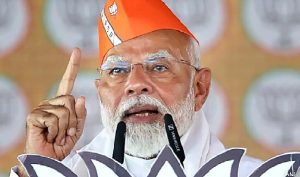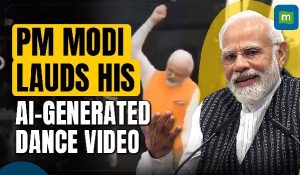17-05-2024
Bureau Report + Agencies
NEW DELHI: An AI video shows an ecstatic Narendra Modi sporting a trendy jacket and trousers, grooving on a stage to a Bollywood song as the crowd cheers. The Indian prime minister reshared the video on X, saying “such creativity in peak poll season is truly a delight.”
Another video, with the same stage setting, shows Modi’s rival Mamata Banerjee dancing in a saree-like outfit, but the background score is parts of her speech criticizing those who quit her party to join Modi’s. State police have launched an investigation saying the video can “affect law and order.”
 The different reactions to videos created using artificial intelligence (AI) tools underscore how the use and abuse of the technology is increasing and creating worries for regulators and security officials as the world’s most populous nation holds a mammoth general election.
The different reactions to videos created using artificial intelligence (AI) tools underscore how the use and abuse of the technology is increasing and creating worries for regulators and security officials as the world’s most populous nation holds a mammoth general election.
Easy to make AI videos, which contain near-perfect shadow and hand movements, can at times mislead even digitally-literate people but risks are higher in a country where many of the 1.4 billion people are tech challenged and where manipulated content can easily stir sectarian tensions, especially at election time.
According to a World Economic Forum survey published in January, the risk to India from misinformation is seen higher than the risk from infectious diseases or illicit economic activity in the next two years.
“India is already at a great risk of misinformation – with AI in picture, it can spread at the speed of 100X,” said New Delhi-based consultant Sagar Vishnoi, who is advising some political parties on AI use in India’s election.
“Elderly people, often not a tech savvy group, increasingly fall for fake narratives aided by AI videos. This could have serious consequences like triggering hatred against a community, caste or religion.”
The 2024 national election being held over six weeks and ending on June 1 is the first in which AI is being deployed. Initial examples were innocent, restricted to some politicians using the technology to create videos and audio to personalize their campaigns but major cases of misuse hit the headlines in April including deepfakes of Bollywood actors, opens new tab criticizing Modi and fake clips, opens new tab involving two of Modi’s top aides that led to the arrest of nine people.
India’s Election Commission last week warned political parties against AI use to spread misinformation and shared seven provisions of information technology and other laws that attract jail terms of up to three years for offences including forgery, promoting rumors and enmity.
 A senior national security official in New Delhi said authorities are concerned about the possibility of fake news leading to unrest. The easy availability of AI tools makes it possible to manufacture such fake news, especially during elections, and it’s difficult to counter, the official said.
A senior national security official in New Delhi said authorities are concerned about the possibility of fake news leading to unrest. The easy availability of AI tools makes it possible to manufacture such fake news, especially during elections, and it’s difficult to counter, the official said.
“We don’t have an capacity…the ever evolving AI environment is difficult to keep track of,” said the official. A senior election official said: “We aren’t able to fully monitor social media, forget about controlling content.”
They declined to be identified because they were not authorized to speak to media.
AI and deepfakes are being increasingly used in elections elsewhere in the world, including in US, Pakistan and Indonesia. The latest spread of the videos in India shows the challenges faced by authorities.
For years, an Indian IT ministry panel has been in place to order blocking of content that it feels can harm public order, at its own discretion or on receiving complaints. During this election, the poll watchdog and police across the nation have deployed.
 Pressmediaofindia
Pressmediaofindia




